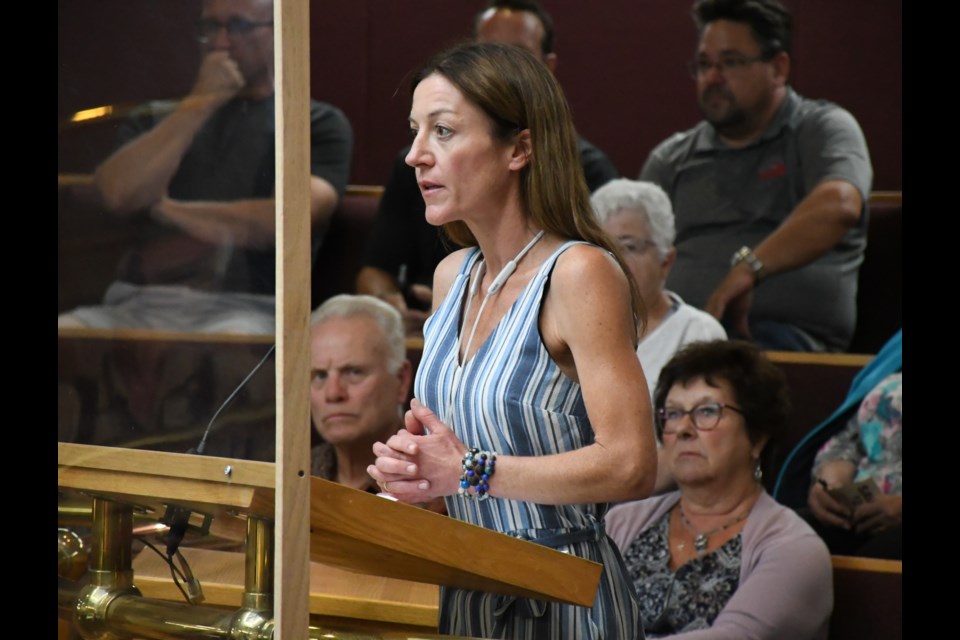Property manager Kristy Van Slyck knows the appeal process is stacked against people who challenge their property assessments, which makes it nearly impossible to obtain fair and equitable treatment.
So, she wants city council to approach the provincial auditor — or the ombudsman or the minister of Government Relations — for corrective action and to potentially force the Saskatchewan Assessment Management Agency (SAMA) to change its evaluation process.
Nearly 40 people packed into council chambers on Aug. 14 to hear the property manager discuss the ongoing struggles property owners face with their assessments.
Presentation
Van Slyck reminded council that it voted unanimously in January to have SAMA conduct a secondary audit of its work and had city administration send a letter with that request. However, the agency denied that request in March and, two weeks later, presented new assessment values for this year’s commercial properties.
“As far as I understand, nothing else has occurred after SAMA denied (the request) … ,” she said. “Of course, SAMA does not want to be audited.”
Van Slyck contacted the Ministry of Government Relations to discuss her concerns, ask for accountability with SAMA and demand that it follow its governing legislation. However, the ministry said in July that she should use the existing appeal system.
“As many of us know, the appeal system is … inherently flawed,” she stated. “The changes SAMA made to this year’s model (and) assessment values did not correct the system.”
Assessment history
SAMA has been involved with property assessments since 1987, while the system was fully regulated up to 2009, explained Van Slyck. The agency first proposed an income-based evaluation approach in 1992, while it began creating that process in 2000 because it wanted to “reinvent the wheel” that generated more money than the existing one.
The agency said it had difficulty acquiring government support for this new approach but was eventually successful in 2009 — nearly 20 years after it proposed the idea.
Appeal system
Van Slyck explained that property owners receive their tax notices before June and have 30 days to appeal. They must provide specific details and proof of why they believe their assessment is incorrect.
“Considering SAMA does not have to provide us with any disclosure of how they arrived at our value until our appeal is submitted, it’s pretty hard for the appellant to (offer exact evidence),” she said. “So they’re asking us to prove an error when we don’t even know what they did.”
The board of revision (BOR) — which hears appeals — is restricted in what it can change while it cannot adjust a property using a single appraisal, Van Slyck continued.
Since SAMA won’t provide data about how it derived its property assessments, someone would have to spend “a ridiculous amount of hours” conducting research — which is unlikely.
If a property owner discovers an error and proves it, BOR cannot correct it because SAMA applied that error equally to all properties in the same group, said Van Slyck.
Another appeal level
Appealing the error at the next level — to the Saskatchewan Municipal Board (SMB) — is also nearly pointless since the SMB can only review the BOR’s decision.
“They’re not looking at it from fresh eyes. And I was totally unaware of that until quite recently,” Van Slyck chuckled. “That explains why my new evidence and all my great thoughts were ignored.”
“The current appeal system does not work,” she added.
SAMA has hired lawyers to defend its property assessment values during appeals, and in 2021, the organization spent $750,000 on legal fees, Van Slyck said. The City of Moose Jaw also contributed $60,000 beyond what it pays the agency in yearly fees.
Moreover, the agency spent 31,000 man-hours in 2021 defending its assessment values, she continued. She believes if SAMA had spent more time fixing its model, it wouldn’t have spent so long on defence.
Van Slyck added that SAMA should return to its pre-2009 assessment model for fairer results.
Council comments
Coun. Jamey Logan asked Van Slyck how she wanted council to help, to which she said it should contact the provincial auditor.
Logan noted that former city manager Jim Puffalt sent a letter to the province requesting assistance but was allegedly denied. However, he said city hall would look for that letter and, once found, council would review the situation with the new city manager.
Said Coun. Crystal Froese, “It’s very interesting to hear the evolution of the income approach and how we arrived at that. Sometimes that history can be lost because it was a decade ago.”
Said Coun. Kim Robinson, “You’ve done a lot of legwork and brought this thing to light. I firmly believe it means it needs closer scrutiny.”
The next regular council meeting is Monday, Aug. 28.
In response to some providers blocking access to Canadian news on their platforms, our website, MooseJawToday.com will continue to be your source for hyper-local Moose Jaw news. Bookmark MooseJawToday.com and sign up for our free online newsletter to read the latest local developments.




